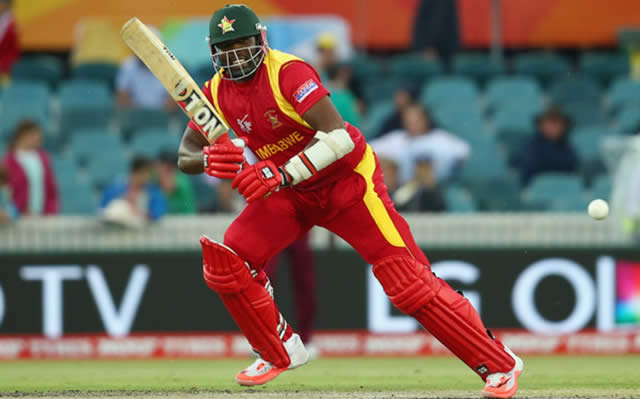Can Masakadza last longer?

Paul Munyuki Sports Reporter
ZIMBABWE cricket batsman Hamilton Masakadza’s recent performance at the just-ended Twenty20 international series against Bangladesh in Khulna saw him breaking a number of records — personal, national and international.
Having been left out of the national team in the Chevrons’ home series against Afghanistan late last year, Masakadza was relegated to the Zimbabwe A side following a poor batting form but his return to the national side — also against Afghanistan — showed the new man he is.
His performance in Bangladesh saw him getting a total of 222 runs in the series, setting a new record for most runs in a series by any batsman in T20 international while his unbeaten 93 became the highest individual score by any Zimbabwean batsman in this format of the game.
This year alone, Masakadza has scored a total of 318 runs in the six T20 internationals he has played, giving him his best average and making it his 53 his best since the start of the year, his previous best being a 42.5 in 2008.
But it was in the series against Bangladesh that gave him much of the limelight, and his average in the series came to 55.5 runs — another feat for the opener as this also became his best in a year.
No doubt supported by Malcolm Waller, Vusimuzi Sibanda and Sean Williams, Masakadza was the mainstay on which Zimbabwe’s come-back in the series was driven on coming from 2-0 down to share the four-match series against a Bangladesh side that had dominated them so well in the first two.
To show he meant business, Masakadza opened the series by equalling his previous career best T20 batting score when he managed 79 to go level with his 2008 score against Canada when Zimbabwe won by 109 runs.
His 79 against Bangladesh in the opener was, however, not enough to help Zimbabwe get a win over the hosts despite a good batting performance from Sibanda with a 46 as the middle order failed to come to the party.
Masakadza’s scores in the second and third games were definitely not what he had hoped for — first a 30 in a game where the only other meaningful contribution came from Malcolm Waller (29) before further dipping by 10 runs in the third.
And this was the game that brought Zimbabwe back to life, Waller (49) top scoring for the visitors Sibanda’s 44 proving vital while Sean Williams’ 32 and Masakadza’s 20 giving the Chevrons a reason to believe they could win the final game and draw the series.
And it took the final game for Masakadza to show his best was yet to come and apparently it came at the same venue he earned his T20 international debut nine years ago against the same side, then coming in at four and managing a 35.
His 93 comprised of eight fours and five sixes after facing just 58 deliveries and came at just the right time, showing leadership qualities after having played the third T20 as stand in captain — just two days before Elton Chigumbura relinquished his captaincy in all formats.
Masakadza showed no reason to panic despite his opening partner Sibanda (4) departing with Zimbabwe on four for the loss of one and has a beautiful knock that was dominated by his trademark shots coming off front foot.
Batting through the innings, he was involved in key partnerships with Richmond Mutumbami for an 80-run second wicket stand and with Waller coming in at four they produced a 61-run partnership.
This is not the first time Zimbabwe has celebrated Masakadza’s name being mentioned in record setting performances given that he entered the grand stage by setting a record — something that has been part of his pendulum-like batting career.
He was still a schoolboy at Churchill High School in Harare when he set the record — since beaten by Mohammad Ashraful — of being the youngest batsman ever to score a century on his Test debut, at 17 years and 254 days.
This was against West Indies in July 2001 when batting at number three instead of his normal opening position, he scored a composed 119 that was largely responsible for Zimbabwe saving the match after conceding a first-innings lead of 216.
Earlier in the year, he had not only become the youngest Zimbabwean ever to score a first-class century, but also the first black player to do so.
Eight years down the line he scored over 1000 runs in ODIs in the calendar year at an average of 43.48 and a strike rate of 88.08, including scores of 156 and 178 not out in the home series against Kenya, the first time a batsman has made 150 or more twice in the same one-day series. Masakadza was part of Zimbabwe’s XI when they made a Test return, playing their first Test in six years against Bangladesh in August of 2011, scoring his second Test century a decade after his first.
However, the big question is: can Masakadza be able to maintain his new found form and guide Zimbabwe to a more memorable ICC World T20 championship in India in two months’ time?











Comments